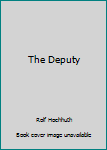The Deputy
Select Format
Select Condition 
Book Overview
Upon its premiere, The Deputy stirred up more controversy and caused greater repercussions than any other postwar work. Based on Rolf Hochhuth's research into the Vatican activities during World War... This description may be from another edition of this product.
Format:Paperback
ISBN:B000NF8X8I
Release Date:January 1965
Publisher:Dell Publishing
Length:352 Pages
Weight:0.40 lbs.
Customer Reviews
5 ratings
A Classic
Published by Thriftbooks.com User , 14 years ago
Not all that long ago, Huchhuth's play was a current event, controversial on the international level. By now, it is as much a part of history as the events it deals with--the Catholic response to the Jewish Holocaust. With its constant lengthy descriptions, its huge appendix essay, and above all its great length, this was a play meant more to be read than staged. Even so, it seems odd that it never gets done anymore, because it has a suspenseful story and it retains its power even in abridgement. Some readers might want to set it side by side with the essay collection entitled The Storm Over The Deputy (also available on this site), to hear the various pros and cons.
A great (if unwieldy) play on a subject of devastating importance
Published by Thriftbooks.com User , 18 years ago
It may be difficult to imagine how one would stage this play effectively: it's length is prohibitive and it moves around from location to location, each described in great, novelistic detail by the playwright, and utterly impractical in a theatrical context. But it's a riveting, rigorously intelligent and utterly damning take of Pius's unforgivable reticense regarding the Holocaust. What with the Vatican's continued talk of canonizing Pius -- in spite of its much-ballyhooed (by the Vatican only) talk of repentence for centuries of murderous anti-Semitism -- this is a timely play and should be read widely.
Stunning and still relevant.....
Published by Thriftbooks.com User , 21 years ago
"The Deputy" is stunning and still relevant, despite the acidic reviews you might find here contesting the pertinence of this play. It's more than probable the negative ratings in regards to this piece belong to the pious who, instead of looking at the objective facts, hide behind their own grandiose illusions regarding the dogmas into which they have been indoctrinated.Afterall, is there any historical doubt that Pope Pius XII did not publicly condemn the wholesale slaughter of Jews by the Nazi regime? I haven't seen any document stating otherwise. Sure, he made blanket condemnations pronounced in the garb of generalities, but that's not what Hochhuth's play addresses. It's a simple question we must ask: should, as some consider, the highest moral authority on the planet straddle the fence in an attempt not to offend anyone, or should we expect a public condemnation of evil on such a grand scale? This, in my view, and in sum, is the dilemma the play poses to each reader.
Fiction can be and here is true to life -I've been there!!
Published by Thriftbooks.com User , 24 years ago
I am disgusted with the two reviews on this site. This book is based on years of painstaking research and in no way an attempt to wash clean the bloody hands of the protestants by shifting blame on Rome. Protestants can be very arrogant and the comments are a sad example. This play is a touching masterpiece. It simply describes the truth and the many-standard morality of which our society is still quite capable. Very worth reading and performing in my opiniion. A work, in its own way more valuable and superior to the diary of Anne Frank. It is fiction but as true as Tolstoy's War and Peace (also fiction).
Hugely important drama on the holocaust
Published by Thriftbooks.com User , 24 years ago
No literary work about the holocaust has so much shaken the conscience of the western world as he Deputy". Since the play first appeared in 1963, it has been reviewed, rereviewed, praised, damned and boycotted (including the American Nazi Party). What I have to add here is (1) praise to Johns Hopkins University Press for republishing the play and (2) rebuttal of the bizarre and shameful comments appearing at this site on July 1, 1999 and October 21, 1999.To any one who has read the play, or attended it, it is obvious that it deals with the HOLOCAUST and nothing less. That Pius II did not protest as strongly and often as he should could have and that he did not protect Roman jews is an important part of the play.Nowhere in the play, the stage instructions, the appendices nor anywhere does Hochhuth "shift the blame" for the holocaust. Indeed, Acts 1-3 and 5 put the responsibility brutally and exactly where it belongs. (The pope, drawn as a caricature of a CEO, appears only in Act 4, essentially denying the reality of the holocaust). The principal character in the play is Riccardo Fontana, a catholic priest (a jesuit), son of a laic counsellor to the pope, who struggles futilely against the Nazis - and the obtuseness of the vatican - and is murdered by the Nazis. Like all characters in the play, Riccardo is a fictional character inspired by a real person. The inspiration for Riccardo came from Bernard Lichtenberg, prelate of St. Hedwig's cathedral, Berlin and father Maximilian Kolbe, martyred in Auschwitz and canonized (John Paul II) in 1982. The play is dedicated to these men.




